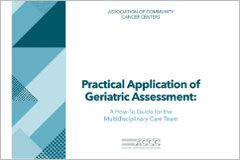Older adults are more likely to be diagnosed with cancer than any other age group. Because the underlying health status of older adults with cancer is generally heterogeneous, comprehensive geriatric assessments (CGAs) are helpful for uncovering age-related vulnerabilities.
CGAs are diagnostic tools and batteries that provide multidimensional, multidisciplinary evaluations of multiple health domains, including functional status, cognition, medical comorbidities, medication management, psychological health, and nutritional status. When used to evaluate an older adult with cancer prior to initiating therapy, CGAs can help oncologists differentiate between fit and frail patients and tailor their treatment accordingly.
Practical Application of Geriatric Assessment: A How-To Guide for the Multidisciplinary Care Team was recently released by ACCC to give community cancer centers a compact guide on how to use different CGAs to inform treatment decision-making, predict morbidity and mortality, guide supportive care interventions, improve patient and caregiver satisfaction, reduce treatment-related toxicity, improve quality of life, and reduce healthcare use. Coauthored by a series of leading clinician experts in geriatric oncology, the guide describes a series of CGAs and offers instruction on how to use them. The seven assessment domains discussed in the guide are:
- Pharmacy/Medication Management
- Psychological Health
Below is an excerpt from the guide on assessing psychological health. To read more, you can access the entire guide on our website.
Psychological Health
Older adults with cancer are at high risk for developing psychological challenges, including depression (30%), anxiety (17%), and psychological distress (41%) at any time throughout the cancer care continuum. The psychological challenges posed by living with cancer can impact treatment delivery and adherence, quality of life, and even survival. Factors such as social isolation, pre-existing psychiatric disorders, and substance use may also impact a patient’s psychological health.
To better understand the subgroups of adults with cancer most likely to experience psychological challenges, providers should conduct a social history of each patient at each clinic visit. This history should highlight potential concerns related to substance use; social support; neglect; and emotional, physical, sexual, and other factors known to influence the psychological health of older adults.
The following methods will ensure capture of the key areas of assessment related to older adults within the psychological health domain (depression, anxiety, and abuse). The Patient Health Questionnaire-9 (PHQ-9) and the Generalized Anxiety Disorder-7 (GAD-7) are two widely used tools for gauging psychological health and have been validated for use in older patients with cancer.
Patient Health Questionnaire (PHQ-9)
The PHQ-9 is a nine-item self-report that is a reliable and valid measure of depression among older adults. The questionnaire’s 4-point response set goes from 0 (not at all) to 3 (nearly every day). The nine items progress from indicating “little interest or pleasure in doing things” to “feeling bad about yourself or that you are a failure,” to having “thoughts that you would be better off dead.” A tenth question asks, “If you checked off any problem, how difficult have these problems made it for you to do your work, take care of things at home, or get along with other people?” The response options for this last question range from “not at all difficult” to “extremely difficult.” Patients who score an eight or higher on the PHQ-9 are likely to be experiencing depression.
Generalized Anxiety Disorder-7 (GAD-7)
The GAD-7 is a seven-item self-report that is a reliable and valid measure of anxiety among older adults. The response set for the GAD-7 ranges from 0 (not at all) to 3 (nearly every day). As with the PHQ-9, there is one additional question that asks patients, “If you checked off any problem, how difficult have these problems made it for you to do your work, take care of things at home, or get along with other people?” When patients score a five or higher, they are likely to be experiencing anxiety.
Want to read more? Distribute the guide to members of your multidisciplinary cancer care team to give them access to the information they need about how to efficiently conduct comprehensive geriatric assessments in busy practices and programs.
Related Content From ACCC:
- Growing Need Demands New Approaches to Caring for Older Adults with Cancer

